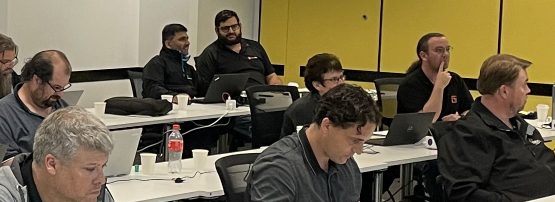
2021 was a busy year for APNIC Academy, with 96 instructor-led (live online, hybrid, and face-to-face) workshops and tutorials delivered to 2,382 people across the Asia Pacific region. This equated to 618 training hours over 140 days, and more than 15,300 trainee-hours.
IPv6, RPKI, and Network Security continued to be the most highly sought-after training subjects, accounting for more than half of the training delivered over the year.
Self-paced training via the online Academy platform attracted 5,428 new account holders in 2021, with course completions reaching 1,735 and the number of virtual lab launches increasing to 6,070. The total number of hours spent on virtual labs exceeded 6,900.
Twenty live webinars — on topics such as network security, Internet measurement tools, policy development and more — reached 1,202 participants.
Community support
Partnering with the community is a core part of APNIC’s training efforts. Training was provided at 11 NOG events across eight economies, in addition to the APNIC, APRICOT and APAN conferences. APNIC also partnered with NRENs, NIRs, CERTs and government agencies to deliver training in 12 Asia Pacific economies.
Meeting the growing training demand would not have been possible without help from APNIC’s network of Community Trainers, who are active network operators with great insights into their local and regional Internet ecosystem. During 2021, 28 Community Trainers from 14 economies assisted at 68 training events.
If you’re interested in supporting technical training in your economy as a volunteer Community Trainer, APNIC would love to hear from you. If you’re able to provide a larger time commitment to training, there’s also an opportunity to become a Retained Community Trainer with competitive remuneration — you can find out more and apply here.
Curriculum development
Training content and curriculum development was another focus for 2021, resulting in the addition of two new instructor-led courses, one new self-paced online course and a number of new labs to the APNIC course catalogue. The new curriculum was driven by community demand and developed with industry subject matter experts (SMEs):
- The Network Monitoring and Management (NMM) course, supported by the APNIC Foundation, was launched in June, and was well received at events such as APNIC 52 and SANOG 37
- The Network Automation course was finalized in December and is ready for delivery in 2022
- A Routing Fundamentals self-paced online course was launched with five new modules (Routing Basics, Use Cases of Static Routes, OSPF Basics, IS-IS Basics, and BGP Basics) including a series of related routing labs in deploying OSPF, IS-IS, and BGP
- Other new labs included MPLS LDP and MPLS Layer3 VPN (Cisco IOS), Linux Basics Lab, Hashing Lab (File Integrity), DHCPv6-PD Lab, SSH Lab, PGP Lab (File and Email Security), Suricata to Analyse Packet Captures Lab, and Vulnerability Scanning and Penetration Testing Lab.
Technical assistance
APNIC trainers and SMEs provided remote technical assistance to 31 operators from 15 economies to overcome challenges related to DNS/DNSSEC, Network (re)design, RPKI/ROV deployment, IPv6 deployment, and building IXPs.
Despite the difficulties of remote technical assistance, the completion of a new Pakistan IXP (handling ~2Gbps of traffic from day 1) was a highlight of the year.
A new Zoom-based Technical Assistance platform was launched, with support from the APNIC Foundation, to better connect APNIC Members with experts in the community, help network operators deal with day-to-day operations, and to share expertise on the best and current Internet technical practice in key areas (including deployment of IPv6 networks, neutral IXPs and root servers).
Learning during the pandemic
The pivot from face-to-face training to live online delivery over the past two years has presented many challenges, but we too have learned and made improvements to how APNIC provides training, including:
- Restructuring the duration of our instructor-led training by breaking down multi-day workshops into shorter, modularized tutorials to reduce zoom fatigue and keep interaction high
- Supplying Community Trainers with a training delivery tool kit consisting of a high-definition webcam, high-quality microphone, and tablet to enhance the quality of their training delivery and enable better engagement with the audience
- Improving audience interaction by including Kahoot quizzes into sessions, adopting problem-based learning methods such as Capture the Flag (CTF), and setting up a Discord server to allow collaboration within labs
- Keeping Live Webinar topics new and interesting by reaching out to technical experts across the globe to share stories on exciting developments happening within the industry.
While APNIC is eager to return to face-to-face events when it is safe to do so, live online instructor-led training will remain a permanent service to provide training more broadly across the region.
As we look ahead to 2022, we welcome any feedback you have on how we can continue to improve APNIC’s training services.
The views expressed by the authors of this blog are their own and do not necessarily reflect the views of APNIC. Please note a Code of Conduct applies to this blog.
